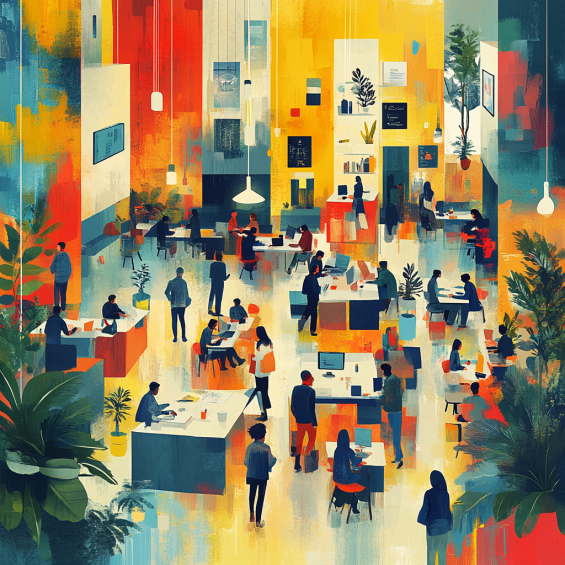I was sitting in a dimly lit coworking space in London, trying to explain what a DAO was to a sceptical developer. “It’s like a company,” I said, “but without a boss. Decisions are made through decentralised governance, using code and votes.” He laughed, shook his head, and muttered, “Good luck recruiting for that.” Fast forward a few years, and DAOs (Decentralised Autonomous Organisations) are everywhere—from funding climate solutions to managing multimillion-dollar treasuries. The job market is exploding, but navigating it? That’s a whole new game.
Decentralised governance has flipped the traditional career script on its head. Let’s dive into what it means to build a career in this space, what works (and what doesn’t), and why this isn’t just a trend—it’s a revolution.
The New Frontier of Work
If you’ve ever dreamed of working on your own terms, DAOs are like a dream come true. There are no CEOs, no rigid 9-to-5 schedules, and no office politics (well, fewer of them). Instead, members collectively vote on everything—from funding new projects to hiring talent.
But here’s the catch: you’ll need to embrace a mindset shift. Working in a DAO means juggling multiple roles, often for different organisations. For instance, I’ve worked with a DAO where I handled recruitment while also moonlighting as a community moderator. Why? Because governance tokens—the currency of DAOs—rarely pay a full salary, at least in the beginning.
Take Bankless DAO, for example. It’s a media-focused DAO where contributors earn tokens for writing, podcasting, or moderating Discord channels. Many start as volunteers, building reputation and connections before moving into paid gigs. The lesson? Flexibility and patience are key.
Skills Over Titles
Forget job titles. In decentralised governance, your skills and contributions speak louder than any LinkedIn headline. Want to be a “governance strategist”? Great—but you’ll need to prove it by writing proposals, analysing on-chain data, or facilitating discussions on governance forums.
Here’s what’s hot right now:
- Governance Facilitation: Managing proposals and ensuring smooth voting processes.
- Smart Contract Development: Coding the rules DAOs live by.
- Community Management: Keeping members engaged and aligned (trust me, this is harder than it sounds).
- Tokenomics: Designing sustainable incentives for members.
I remember onboarding a designer for a DAO focused on regenerative finance. She had no prior crypto experience but was a whiz at branding. Within months, she was leading the DAO’s identity overhaul—and earning more than her old agency job. Her secret? Diving in, asking questions, and showcasing her work.
The Challenge of Trust
In a world without bosses, how do you know whom to trust? This is one of the trickiest parts of decentralised governance. There’s no HR department vetting candidates, and scams are an unfortunate reality.
What’s worked for me is building relationships slowly. Start by contributing to a DAO you admire—join their Discord, attend calls, and get to know the community. Platforms like Coordinape, which let members allocate funds to each other, are also great for proving your value.
Real-world example? When I joined Gitcoin DAO as a talent scout, I spent weeks just listening—watching how decisions were made, learning who the key players were. It paid off. By the time I pitched a recruitment strategy, I had enough trust and context to make it stick.
The Future is Fragmented
Decentralised governance isn’t just changing careers—it’s reshaping industries. Take PleasrDAO, which crowdfunds high-value NFTs, or KlimaDAO, focused on offsetting carbon emissions. These are niche, mission-driven communities, each creating unique opportunities for contributors.
The beauty of DAOs is that you can align your work with your passions. Love gaming? Check out Yield Guild Games. Obsessed with social impact? ImpactDAO might be your jam. And the best part? These organisations thrive on diversity of thought—so whether you’re a coder, marketer, or policy expert, there’s a DAO for you.
But fragmentation comes with challenges. Most people juggle multiple DAOs to cobble together a full-time income. It’s rewarding but exhausting. My advice? Focus on 1-2 DAOs that align with your goals, and scale up as you find your rhythm.
Decentralised governance is more than just a buzzword—it’s a shift in how we think about work, power, and community. Sure, it’s messy. It’s uncharted territory, filled with ambiguity and trial by fire. But for those willing to adapt, the rewards are immense: freedom, creativity, and the chance to be part of something bigger than yourself.
So, is a career in the age of DAOs for you? That depends. Are you ready to take risks, wear multiple hats, and embrace a future where your reputation is your résumé? If the answer is yes, then welcome to the frontier.




